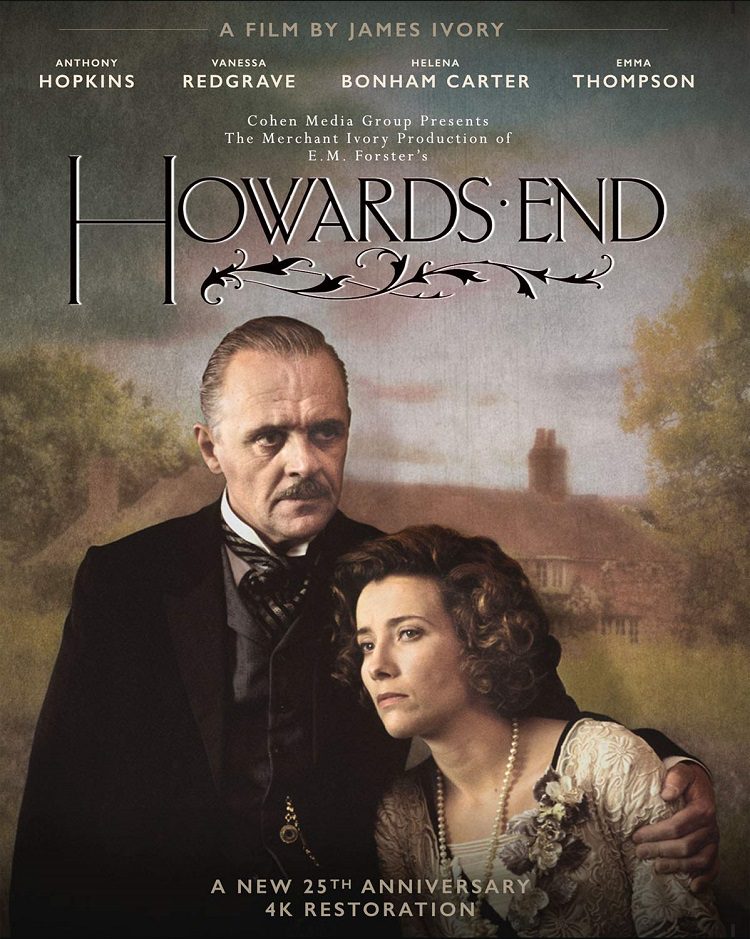
Upon watching the new 4K restoration of Howards End by the Cohen Film Collection, I come to realize it was my very first time watching a Merchant-Ivory Production. This surprises me as I feel like I know exactly the sort of films they made. Founded in 1961 by producer Ismail Merchant and director James Ivory, the film production company became well known in the ’80s and ’90s for their beautifully made period films that often adapted literary works set in Edwardian England. Working with modest budget (often adapting books from the likes of Henry James and E.M. Forster that were in the public domain, and asking their actors to take modest salaries), they produced lush films that continually won high praise and awards. Merchant-Ivory Productions became synonymous with a certain type of film filled with world-class British actors playing genteel characters who suffer emotional tragedies while wearing the most glorious clothes and sitting in magnificent houses.
So it is with Howards End. Set it in the early parts of 1900s England, the story concerns Margaret Schlegel (Emma Thompson), a well-to-do spinster who is enlightened for the period, and opinionated, but also very kind. She forms a friendship with Ruth Wilcox (Vanessa Redgrave), the wife of Henry Wilcox (Anthony Hopkins), a rich capitalist. There was a bit of a embarrassing social faux pas between the families the previous summer, but Margaret shows Ruth extreme kindness, demonstrating her good heart and strong character.
After Ruth dies, a few months later Henry asks Margaret to marry him and she accepts.Though Margaret has some very strong and modern opinions about life, politics, and women’s roles, she seems to accept her perceived duty as a wife and stands by her husband’s side through thick and thin, much to the chagrin of her sister Helen (Helena Bonham Carter).
Early in the film, the sisters befriend Leonard Bast (Samuel West), a lower-class worker who has come upon hard times. The ladies ask Henry for advice on how to help Leonard, and he notes that he’s heard the company Leonard is working for is about to go bust and suggests he find work elsewhere. Leonard takes this advice but as it turns out the new company he is hired on at quickly does some restructuring and has to let Leonard go while the old company makes a turn and does very well for itself. When Helen puts it to Henry that he has some responsibility in putting Leonard out on the street, Henry shrugs it off saying “The poor are poor. One is sorry for them, but there it is.”
That scene occurs about halfway through the film and serves as its heart. Certain types of British films have always concerned themselves with the country’s class system, and Howards End, much like the more recent Downton Abbey, ponders the usefulness of that system at a time when it was beginning to break apart. To a man like Henry, the poor serve their lot in life; it is perhaps a tragic one, but it is there’s to serve. But to Helen and Margaret that simply will not do.
Later, we learn that while Henry was still married to Ruth he had an affair with a younger woman. In the film’s most stylish scene, he begs forgiveness from Margaret as she learns of his infidelity. Several times over, the scene fades to black only to open on him continuing with his apologies, as if his posturing goes on for a long time and the film simply does not have time for it all. Margaret does forgive him, yet when Henry learns of a similar indiscretion between two others, he takes the high road and cannot find it in him to forgive.
This leads to the film’s fairly explosive (as explosive as this sort of drama gets anyway) conclusion. Its final scene is not quite as gratifying as the previous couple of hours have been, but it still left me enormously satisfied.
Howards End is gorgeous in its lushness. The sets, settings, and costumes are magnificent in their luxuriousness. James Ivory’s direction is not flashy, save for a scene or two, but is wonderful in its economy and directness. All of the acting is pitch perfect, but it’s Emma Thompson who stands out. Her Margaret Schlegel is a wonder to behold. She won an Academy Award for it.
The Cohen Film Collection’s release of the film touts a new 4K restoration culled from the film’s original negative. Both Ivory and the cinematographer Tony Pierce-Roberts oversaw the transfer and it looks marvelous. It’s a color-rich film and they look rich and full of depth. I noticed no incidents of scratching or other problems with the video. The audio likewise sounds very good.
This release is busting over with extras. Disk 1 includes the film plus an audio commentary with film critics Wade Major and Lael Lowenstein. As one expects from a critical commentary, this one is loaded with information about Merchant Ivory productions and the film as well. Disk 2 features three different interviews with James Ivory from 2016, two lengthy and well thought-out documentaries on the film, plus trailers and a brief behind-the-scenes video. It comes in a handsome slipcase with a nice booklet of essays.
It should be noted that Howards End has also been released by the Criterion Collection. While I’ve not been able to compare the two, the reviews of the Criterion version are filled with praise. Whichever version you purchase the film is an absolute must-see for film fans. Cohen has done a really marvelous job with this release with an excellent audio/video quality and a wealth of supplementary materials.